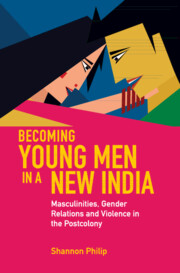Book contents
- Frontmatter
- Contents
- List of Figures
- Note on Terms and Translations
- Acknowledgements
- Introduction: Young Men in a Neoliberal India
- 1 Becoming a ‘New’ Indian Man
- 2 Making Masculine Bodies
- 3 Desexing Men and Hypersexing Women
- 4 Urbanisation and the Gendering of a Smart City
- 5 Men’s Violence and Women’s Safety
- Conclusion: Fragilities of a New Indian Man
- Appendix: Urban Smart Striver Profiles
- References
- Index
Introduction: Young Men in a Neoliberal India
Published online by Cambridge University Press: 31 March 2022
- Frontmatter
- Contents
- List of Figures
- Note on Terms and Translations
- Acknowledgements
- Introduction: Young Men in a Neoliberal India
- 1 Becoming a ‘New’ Indian Man
- 2 Making Masculine Bodies
- 3 Desexing Men and Hypersexing Women
- 4 Urbanisation and the Gendering of a Smart City
- 5 Men’s Violence and Women’s Safety
- Conclusion: Fragilities of a New Indian Man
- Appendix: Urban Smart Striver Profiles
- References
- Index
Summary
The Paradoxes of Young Indian Men
Raj turned up the volume of the Hindi rap music playing in his car as we drove through the South Delhi traffic. I was sitting in the passenger seat, whilst Raj frantically picked music through his phone in one hand and manoeuvred the steering wheel with the other. He told me, ‘I need loud music to drown out the mess of the city; I need to escape from it all.’ As we made our way through the traffic, we continued chatting, and he added, ‘The worst drivers in Delhi are these bloody autorickshaws and women; I don't know what is wrong with them, they just don't know how to drive….’ He explained that he would rather travel by Uber than an autorickshaw any day and that he would never be driven by a woman. ‘My mother does not know how to drive, and my sister wanted to learn, but I said no, it's not safe for her … and the girls I date only like to be driven around!’
As we continued our drive, Raj got a call from his father. His phone, which was connected to the car speaker, automatically cut out the loud Hindi rap music and the words ‘Papa calling’ flashed on the screen along with a loud ring. Raj quickly looked at me and gestured for me to be silent by placing his finger on his mouth. ‘Yes Papa, what's happening …,’ he said in Hindi, picking up the call on the loudspeaker. His father asked him where he was in a brusque tone, and Raj immediately lied and said, ‘I’m just going to college, Papa; we are having extra classes today, so I’m just on my way….’ His father hesitantly said okay to Raj's story and hung up the call. The loud Hindi rap music automatically burst out again as the call got disconnected. Raj turned to look at me, relieved that the call had ended, and said, ‘Bhenchod (sister-fucker) … My parents are constantly on my ass,’ as we continued our drive to the shopping mall.
This brief ethnographic vignette provides a glimpse into some of the paradoxes shaping the everyday lives of young men in a ‘new’ India. These seemingly ‘ordinary’ and routine events provide several themes that need careful unpacking.
- Type
- Chapter
- Information
- Becoming Young Men in a New IndiaMasculinities, Gender Relations and Violence in the Postcolony, pp. 1 - 29Publisher: Cambridge University PressPrint publication year: 2022



